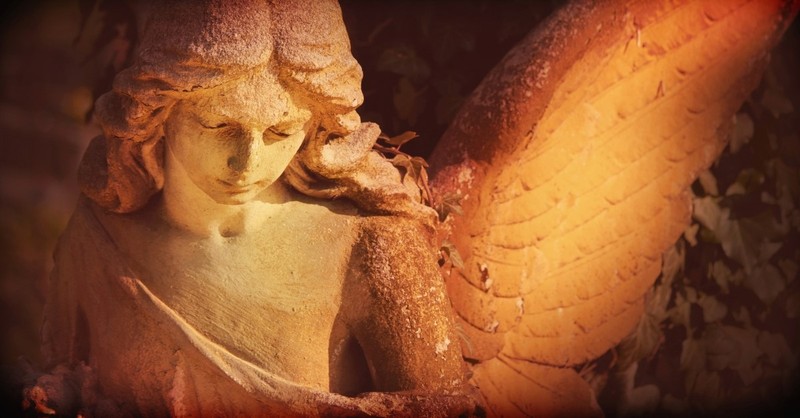What Message Did the Christmas Angels Bring?
- Valerie Fentress Contributing Writer
- Updated Apr 18, 2024

Christmas is full of iconic characters and images that fill us with joy. One of these is the Christmas angel. They end up on the top of our Christmas trees and often grace the yard of the winner of the Christmas décor contest. Angels are referenced throughout scripture, from Genesis to Revelations. But what part did angels play in the Christmas story, and what message did the angels bring that first Christmas day?
What Gospels Mention Angels and the Christmas Story?
Of the four gospels, the angelic encounters of the Christmas story are mentioned only in Matthew and Luke. The Gospel of Mark focuses on Jesus’ adult life, which excludes the Brith narrative, while John’s gospel focuses on the seven signs that Jesus was the Son of God and the Messiah, which doesn’t include the birth narrative.
In Matthew, the only angel mentioned in the birth of Jesus narrative is in Matthew 1: 20-23. Here, the angel is referred to as “an angel of the Lord,” who comes to Joseph in a dream when he’s planning to divorce Mary after hearing she is pregnant. He tells Joseph that Mary is pregnant by the Holy Spirit and that the child will be called Jesus, who will fulfill the prophecy of Isaiah 7:14, which says, “Look, the virgin will conceive and bear a son, and they will call him Emmanuel.”
The Gospel of Luke mentions the most angel encounters during the Christmas story. This is the only gospel that identifies the angel as Gabriel. Gabriel is one of two named angels in the Bible. Michael, the archangel, is mentioned in Daniel, Jude, and Revelations.
Pamela Palmer states, “We do not know if Gabriel is an archangel because that is never stated in Scripture, but the mention of his name alludes to the fact that he is a lead angel that delivers vital messages.” Other than being the main Christmas angel, Gabriel also appears in Daniel (8:16, 9:21), where he confirms a prophecy that Daniel receives.
What Message Did the Angel Gabriel Give to Zachariah Before Christmas?
In the New Testament, we are first introduced to the angel Gabriel in the birth announcement of John the Baptist (Luke 1:5-20). Zacharias was a priest with no children because his wife, Elizabeth, was barren. At a time in the temple when Zechariah’s division of priests was on duty, Zechariah was chosen to enter the holy place to burn incense before the Lord. When Zechariah entered, he saw “an angel of the Lord” standing next to the altar of incense. This angel communicates that Elizabeth will bear a son, name him John, he will be a Nazarite, and be filled with the Holy Spirit to “make ready for the Lord a people prepared for him” (Luke 1:17).
We don’t learn that this angel of the Lord is the angel Gabriel until Zachariah starts to doubt this revelation since he and Elizabeth are old. Sounds familiar; think back to Genesis 18 with Abraham and Sarah. Because of his doubt, he is struck without the ability to speak until his son is born. Yep, that’s nine months or so of silence.
What Message Did the Angel Gabriel Give to Mary Before Christmas?
Gabriel appears six months after giving his message to Zechariah in the town of Nazareth, eighty miles to the north of Jerusalem. Gabriel appears before a virgin, Mary, who is engaged to a man named Joseph. We are told in Luke 2:1 that this is Gabriel, even though the angel does not announce his name as he did to Zechariah. After announcing himself, the angel Gabriel first says to Mary, “Do not be afraid, Mary, for you have found favor with God!” After calming her fears, he tells Mary that she will become pregnant, give birth to a son, and name him Jesus. Not only that, but the angel also says that “He will be great and will be called the Son of the Most High, and the Lord God will give him the throne of his father David. He will reign over the house of Jacob forever, and his kingdom will never end. (Luke 1:32-33).
What Did the Angels Tell the Shepherds at Christmas?
Once Jesus was born in Bethlehem, Luke 2: 8-20 tells us that an angel of the Lord appeared to shepherds in the fields near Bethlehem. This angel is not given a name but again calms the shepherds' fears and communicates a message from God.
The angel tells the shepherds, “Today, in the town of David, a Savior has been born to you; he is Christ the Lord.” This angel is clear about the who, where, and even the why this child is important.
The town of David clearly refers to Bethlehem, where David lived with his father Jesse and was anointed by Samuel in 1 Samuel 16.
The angel of the Lord makes two references to why this child is important. The angel refers to the child first as “Savior” and then as “Christ the Lord.” Dr. Thomas Constable mentions in his Sonilight Notes that “The unusual phrase ‘Christ the Lord,’ which occurs nowhere else in the New Testament, probably means ‘Messiah God.’ “Savior’ occurs only here in Luke's Gospel in reference to Jesus.” These terms were significant because any first-century Jew, low or high status, would have known they referred to the promised Messiah from Isaiah.
Another notable detail is the sign that the angel told the shepherds in Luke 2:12. The angel of the Lord tells the shepherds, “You will find a baby wrapped in cloths and lying in a manger.” While we, as the readers, know that Mary wrapped the baby in clothes and laid him in a manger, what is significant about this is not well-known to modern readers.
Alfred Edersheim observes in his book The Life and Times of Jesus the Messiah that there is evidence in the Mishnah, the first collection of Jewish oral traditions, that the sheep pastured around Bethlehem were destined for sacrifice in the temple. The requirements for these sacrificial lambs were that they were to be unblemished. For the lambs to remain unblemished, they were often wrapped tightly in cloth and placed in a manger to keep them safe and clean. Not mangers of wood but mangers of stone. If these oral traditions align with the events of the Christmas story, it is a beautiful picture that Jesus is “the lamb of God, come to take away the sins of the world.” (John 1:29)
Once the angel of the Lord completed the proclamation of Jesus’ birth, the angel was joined by a multitude of “heavenly hosts” praising God for what he had done on Christmas day.
Did Angels Speak to the Wise Men At Or After Christmas?
Many of our Christmas movies and Nativity pictures portray the Wise Men or Magi coming to Bethlehem at the time of Jesus’ birth, right alongside the Shepherds. While this makes a beautiful picture, there is no biblical reference to when the Wise Men arrived in Bethlehem.
We do know from Matthew 2:3 that King Herod was king at the time of the Magi coming to Israel. King Herod was a Roman-appointed ruler of Israel from 37-4 BC. Andrew Steinmann and Rodger Young argued that the correct dates for Herod's reign are 31 to 1 B.C., placing the birth of Jesus in late 3 B.C. or early 2 B.C.
The account of the Visit of the Magi is only found in the gospel of Matthew. In this account, the Magi from the East come to Jerusalem seeking a child who would be the “King of the Jews” (Matthew 2:2). They encounter King Herod. After seeking information from the chief priests and teachers of the law, they are pointed to Bethlehem because of the messianic prophecies found in Micah 5:2. After some instructions from Herod, the Star the Magi had followed returns, confirming a location in Bethlehem where they are to go. Once they arrive and present their gifts, they are warned in a dream not to return to Herod. Matthew 2:12 doesn’t say that an angel communicated the message. Still, since an angel appeared to Joseph in a dream, both before Jesus’ birth (Matthew 1:20) and after the Magi had left (Matthew 2:13), it is assumed that an angel gave the warning to the Magi.
Samuel J. Andrews states that “the order of events following Christ’s birth to the time he went to reside at Nazareth, is much disputed. The chief point of controversy is respecting the time of the visit of the Magi.” Early church traditions suggest that the Magi arrived 13 days after Jesus’ birth on January 6, which has come to be called the Feast of the Epiphany.
But without any scriptural evidence to suggest when the Christmas Star was in the sky or how far the Magi traveled from the East, we can’t say when the Magi arrived or when their dream warned them not to return to Herod.
Lisa Loraine Baker says, “It ought to be a comfort and encouragement to see how involved God’s heavenly creatures have been and are with humanity.” God sent his messengers to make sure that there was no doubt that after four hundred years of silence and lack of prophets, he was on the move.
Photo Credit:©Getty Images/Zwiebackesser

You can find out more about Valerie, her books, and her blog at www.valeriefentress.com.
This article is part of our larger Christmas and Advent resource library centered around the events leading up to the birth of Jesus Christ. We hope these articles help you understand the meaning and story behind important Christian holidays and dates and encourage you as you take time to reflect on all that God has done for us through His Son, Jesus Christ!
What Is Christmas? Understanding History, Origin, and Traditions
The History of Santa Claus: Origin of St. Nicholas & Christmas Traditions
Christmas Prayers and Blessings
The Beautiful Meaning and Purpose of Advent
Advent Prayers
Advent Wreath & Candles - History, Meaning, and Tradition
The History and Meaning of the Advent Calendar




















